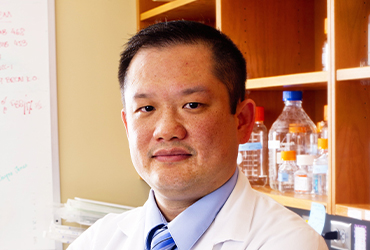Impact of the AACR-TNBCF Partnership

The partnership of the AACR with the Triple Negative Breast Cancer Foundation (TNBCF) reflects the commitment of both organizations to support the next generation of cancer researchers, specifically, those who are focused on triple negative breast cancer (TNBC) research to make a difference in the lives of patients with triple-negative breast cancer.
Researchers supported by the AACR-TNBCF partnership have made progress against triple negative breast cancer on multiple fronts. Here are some of the highlights:
Therapeutic strategy development
- 2015 AACR-TNBCF Career Development Award recipient Eddy S. Yang, MD, PhD previously found that combining lapatinib (an inhibitor that blocks the EGFR and HER2 proteins) and veliparib (an inhibitor of the PARP enzyme) had greater anti-tumor activity than single agent alone in preclinical TNBC models. Based on these findings, he led a first-in-human pilot study testing the lapatinib/veliparib combination in metastatic TNBC (NCT02158507). The combination demonstrated a manageable safety profile and promising efficacy.
Dr. Yang continues to be involved in clinical trials that explore the use of DNA repair inhibitors in breast cancer either as single agent or in combination with the HER2 blocker trastuzumab.

- 2018 AACR-TNBCF fellow Claire Lhuillier, PhD showed how radiotherapy promotes the expression of genes encoding immunogenic mutations, thereby increasing chances of success of neoantigen vaccinations. Although tumor control was not accomplished by combining radiation and vaccination, her results demonstrated that radiation provided additional benefit in combination with immune-based therapies for poorly immunogenic TNBC.
Relapse prediction

- 2016 AACR-TNBCF Career Development Award recipient Christina Curtis, PhD sought to identify pro-metastatic characteristics of TNBC cells. She and her research group developed a computational tool called SCIMET and analyzed published exome sequencing data from two cohorts of paired primary tumors and metastatic breast cancer patients. A fifth of these breast cancer patients had TNBC. She and her laboratory published their work on genetic factors that predicted whether a patient relapsed within 5 years after surgical removal of their tumor.